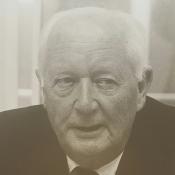Lord Henry Alexander Benson
 The son of Alexander Stanley and Florence Mary nee Cooper Benson was born August 2, 1909 in Johannesburg, South Africa where he was educated first at a private school and then at a government school. Benson's mother was the daughter of Francis Cooper, the third of the four Cooper brothers.
The son of Alexander Stanley and Florence Mary nee Cooper Benson was born August 2, 1909 in Johannesburg, South Africa where he was educated first at a private school and then at a government school. Benson's mother was the daughter of Francis Cooper, the third of the four Cooper brothers.
As the first living non-American to be elected to the Accounting Hall of Fame, much of his career can be traced to Coopers & Lybrand in London, England. He was articled to the firm in 1926 at the age of 17. He became an associate of the Institute of Chartered Accountants in England and Wales in January 1932, having taken fourth place in his final examination; he became a fellow of the Institute in 1937. He became a partner with Coopers & Lybrand in 1934 and he served as senior partner from 1947 until he retired from the firm in 1975.
His tenure with the firm was interrupted in the 1940s (1940-45) to serve with the Grenadier Guards in the British Army. While with the Army he became a member of the Special Operations Executive, being sent to command the unit in Cairo and to wind it up in the Middle East. He attained the rank of colonel. He was transferred, [for a period] from September 1943 to July 1944, to the Ministry of Supply to advise that department on the reorganization of the accounts of the Royal Ordnance Factories. He was appointed director of the Ordnance Factories in December 1943 to implement the reorganization. Released from the army for government work, he was appointed, in March 1945, Controller of Building Materials at the Ministry of Works and in the same year (October 1945) he was given a special three-month appointment to advise the Minister of Health on housing production. He returned to Coopers & Lybrand in 1946, the year in which he was made a Commander of the Order of the British Empire. From 1946 on, his career is a history of public and professional service.
His public service had been extensive and varied. This service included being a member of the Royal Ordnance Factories Board (1952-56); member of the Tribunal of Inquiry under the Prevention of Fraud (investments) Act, 1939 (1957-75); member of the Wilson Committee to review and make recommendations for further research into processes of transformation of coal into oil, chemicals, and gas (1959-60); and member of the Special Advisory Committee to examine structure, finance, and working of organizations controlled by the British Transport Commission (1960). He was appointed by the Minister of Commerce, Northern Ireland to investigate the position of the railways, to make recommendations, and report on effect of the recommendations on the transport system of Ulster Transport Authority (1961). He was also appointed chairman of a committee to examine possible economies in the shipping and ancillary services engaged in meat, dairy products, and fruit trades of New Zealand (1962). In 1963, he was appointed to a committee by the Chancellor of the Exchequer to investigate practical effects of introduction of a turnover tax. He was a Joint Inspector of the Board of Trade to investigate affairs of Rolls Razor Ltd. (1964) and he served as independent chairman of the British Iron and Steel Federation Development Coordinating Committee (1966).
He had been active in professional organizations, serving as president (1966-67) and vice president (1965-66) of the Institute of Chartered Accountants in England and Wales and a member of its Council (1956-75). He served as vice president (1969) of the Union Europeene des Experts Comptables Economiques et Financiers. He had been chairman (1973-76) of the International Accounting Standards Committee and a major force in the development of international accounting standards. He served as a member of the Governor's City Liaison Committee (1974-75) and after he retired from Coopers & Lybrand in 1975, he devoted his energies over the next eight years to being advisor to the Governor of the Bank of England (1975-83).
His public and professional services brought him many honors including knighthood in 1964. In 1971, he was awarded Knight Grand Cross of the Order of the British Empire and in 1981 he was created baron (life peer). He received the University of Hartford's Distinguished Service Award in 1977 and the Founding Societies' Centenary Award of the Institute of Certified Accountants in 1984.
He kept himself occupied by taking part in the proceedings of the House of Lords and serving as a member of House of Lords select committees. His autobiography, Accounting for Life, was published in 1989.
He married Anne Virginia McLeod on September 2, 1939; they had three children. In his leisure time he enjoyed shooting and sailing. Lord Henry Alexander Benson died on March 5, 1995 at age 85.
 The son of Alexander Stanley and Florence Mary nee Cooper Benson was born August 2, 1909 in Johannesburg, South Africa where he was educated first at a private school and then at a government school. Benson's mother was the daughter of Francis Cooper, the third of the four Cooper brothers.
The son of Alexander Stanley and Florence Mary nee Cooper Benson was born August 2, 1909 in Johannesburg, South Africa where he was educated first at a private school and then at a government school. Benson's mother was the daughter of Francis Cooper, the third of the four Cooper brothers.